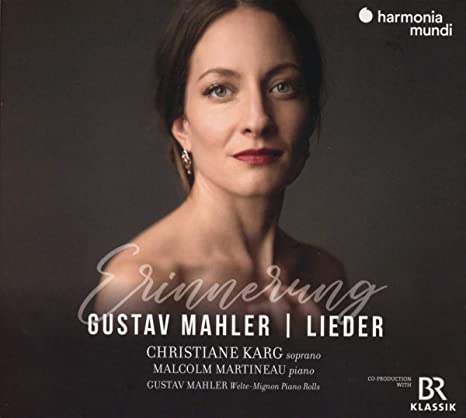
ESSENTIAL RECORDINGS

Lieder from Des Knaben Wunderhorn
Lieder und Gesänge aus der Jugendzeit
Rückert-Lieder
Des Knaben Wunderhorn - Das himmlische Leben (acc. Gustav Mahler on Welte-Mignon Piano Rolls)
There is no doubt that this is yet another excellent recording featuring a collection of Lieder by Gustav Mahler (1860-1911), presented in their arrangement for voice and piano. Christiane Karg is a sought-after recitalist, with plenty of fine recordings to her credit which include songs by a variety of composers, Mozart operas, the Brahms German Requiem as well as Beethoven's Ninth Symphony to name a few. And Malcolm Martineau is a highly sensitive and expressive accompanist who has been a strong support on many recordings by some of the world's top singers.
So what sets this particular recording apart from the other remarkable dozens on offer? Why Gustav Mahler himself of course. In 1905, Edwin Welte who was behind the invention of the piano roll system, invited the composer amongst others to try out this new mechanism. Mahler obliged and as a result left behind for posterity a handful of his piano arrangements of some of his own works, including the Das himmlische Leben which is the final movement, for voice and orchestra, of his Symphony No. 4. There are a few recordings on the market of these Mahler piano rolls, and please correct me if I'm wrong, but I believe this is the world premiere attempt by a singer to use these Mahler originals as accompaniment. You will notice that Mahler's playing was impulsive, and included irregularities in tempo and dynamics. Now the main job of an accompanist is to follow and support the singer, but in this case Christiane Karg had no choice but to adapt to Mahler's rather elastic interpretation. Despite the fact that she states in the booklet notes that she enjoyed the "privilege of making music with Gustav Mahler", it couldn't have been easy. But even though in some passages it seems like she can barely keep up with his sudden tempo swings, the overall effect is quite spellbinding. Her synchronization is quite accurate, and most importantly, she still manages to express the feelings within the text.
If you're a Mahler enthusiast, this is about as close to the source as you can get. The impeccable transfer of sound from the original rolls to a studio grand piano, fools the ear to believe that Gustav and Christiane are but a few feet apart.
Jean-Yves Duperron - October 2020